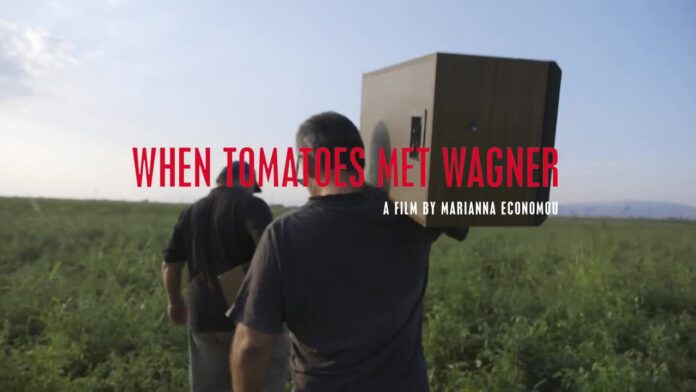“I wanted to make a film about the abandonment of the countryside. It was something that made me feel sad, whenever I travelled around Greece, and came across these deserted or semi-deserted villages. I learnt this is not a Greek phenomenon, it happens all over the world.” said Marianna Economou, the director of the film ‘When Tomatoes Met Wagner’
To mark World Food Day, Ciné-ONU in partnership with FAO and UNEP, screened Marianna Economou’s heart-warming film, “When Tomatoes Met Wagner”. The theme of this year’s World Food Day is our actions are our future: better production, better nutrition, a better environment, and better life. The film perfectly illustrates all these issues with humour, music, and poetry.
‘When Tomatoes Met Wagner’ follows protagonist Alexandros Gousiaris, alongside his cousin and five elderly village women, in their journey to take on the world market with their organic tomato products. The film is set in Elias, a small rural village in Greece.
A fascinating discussion on the solutions to the decline of rural areas, the impact of organic farming on climate change, and the role of women in agriculture followed the screening.
Decline of rural life
One of the major issues reflected in the film is of more and more people moving from rural areas to cities. “It addresses the gap between the policies we set up to tackle issues about rural areas, and what is really happening on the ground” said Tassos Haniotis, Director of Strategy, Simplification & Policy Analysis at the European Commission Directorate-General for Agriculture & Rural Development.
The lack of opportunities in rural areas poses a threat to the production of small-scale farms. The solution to this threat is to adapt and innovate. “The film shows how much Alexandros Gousiaris has to innovate to be able to continue operating in this market” said Maximo Torero, Chief Economist of FAO, referring to a scene in which Alexandros Gousiaris changes the recipe for his tomato products to include quinoa – a popular food trend.
According to Tassos Haniotis, the solution to rural decline is not just through the economy. The solution is looking at “where consumer choices and trends are going, the gap between the costs that the producers have to meet, and the need to connect with real people”.
Impact of climate change
The decline of rural life also connects to changes in climate. “We have seen too many people move into cities. This generates problems within the environment with land abandonment, intensification of land where it’s not abandoned, and issues that relate to social problems.” said Tassos Haniotis.
Diversity and resilience were repeatedly used in the discussion on climate change. Tassos Haniotis explained the importance of these words: “When you don’t have much specialisation in agriculture, you manage to keep diversity. And diversity is necessary to be able to have resilient systems.”
Organic farming, as exemplified by Alexandros Gousiaris in his production methods, increases biodiversity, and biodiversity is one of the most important elements in the context of fighting climate change. “It is so important for our future” stressed Tassos Haniotis.
Women’s role in agriculture

Beyond the film, women make essential contributions to agriculture and rural enterprises. Aggregate data shows that women comprise about 43 percent of the agricultural labour force globally and in developing countries.
“The role of women is huge in agriculture. It is something we need to keep pushing and try to keep growing. It is extremely important.” remarked Maximo Torero
The importance of relationships
“What I take from this film,” said Marianna Economou “is how important human relationships are, how important humour is, and how important the stories are”. Stories are what bridge the two ends of the production line. They are what connects the producer to the market and to the consumer.
“When Tomatoes Met Wagner shows us the importance of adaptation to the market, and at the same time, the importance of this sector and how much we have to make sustainable agriculture attractive again” concluded Maximo Torero.



